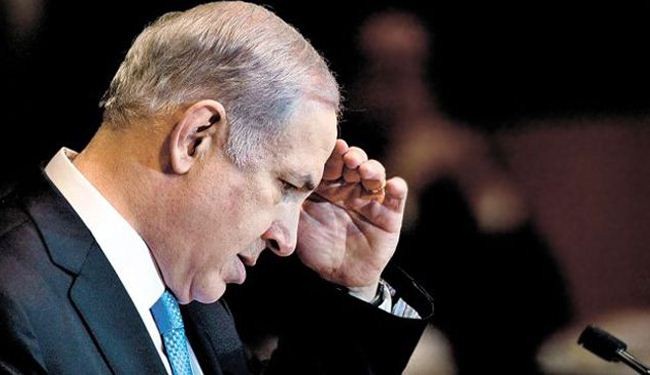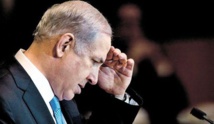Pletka asked: “There are plenty of voices, I would say growing in volume both in the U.S. and I think even in Israel, who would suggest that we are better off with the Gaddafis and the Saddams and the Assads in place to tamp down on the Islamists who rise up, and that secular dictatorship is really the solution we should look for the in the rest of the Middle East. Others say that democracy is only fertile ground for Islamists, who will rise up. Where do you come down on that?”
Netanyahu responded: “Well, when I went to serve in the United Nations 100 years ago, as Israel’s ambassador, there was a woman there, her name was Jeane Kirkpatrick [applause] and I had read an article that she had written called “Dictatorships and Double Standards.” And she said, basically, in this article, she said: “We are committed to the larger battle against Soviet totalitarianism and on occasion we decide, for the larger goal, to make arrangements with secular dictatorships.” That’s basically what she said.
“Now mind you, Saddam was a horrible, horrible, brutal killer, so was Gaddafi, there’s no question about that. I had my own dealings with each of them. But I do want to say that they were, in many ways, neighborhood bullies. That is, they tormented their immediate environment but they were not wedded to a larger goal.
“The militant Islamists, either Iran leading the militant Shiites with their proxies, Hezbollah and Islamic jihad and Hamas, even though Hamas is a Sunni… Or the militant Sunnis led by Daesh—by ISIS—they have a larger goal in mind. Their goal is not merely the conquest of the Middle East, it’s the conquest of the world.
“It’s unbelievable, people don’t believe that. They don’t believe that it’s possible to have this quest for an imamate or a caliphate in the 21st century, but that is exactly what is guiding them. And against this larger threat that would present two Islamic states. One, the Islamic state of Daesh, and the other the Islamic Republic of Iran, each one of them is seeking to arm themselves with weapons of mass death. Chemical weapons in the case of ISIS, nuclear weapons in the case of Iran. That poses a formidable threat to our world.
“Therefore, if I have to categorize the threats, I would say that these are the larger threats. Doesn’t mean you have to form alliances with secular dictatorships, it means you have to categorize ‘what is the larger threat?’ And that is something that I think is required from all of us. Political leadership involves always choosing between bad and worse. I seldom have had a choice between bad and good. I welcome it when it happens, but these are by far the easiest choices. It’s choosing between bad and worse that defines a good part of leadership, and I think I know how to choose that.”
“But here’s what I do define in Syria: I don’t want Syria to be used as a launching ground for attacks against us. And I have said this to Vladimir Putin when I flew to Moscow to see him – I went to see him first to see that our planes don’t crash at each other, it’s not a good idea. But I told him, here’s what we do in Syria: we will not allow Iran to set up a second front in the Golan. And we will act forcefully, and have acted forcefully, to prevent that. [Applause] We will not allow the use of Syrian territory, from which we would be attacked by the Syrian army or anyone else, and we have acted forcefully against that. And third, we will not allow the use of Syrian territory for the transfer of game changing weapons into Lebanon into Hezbollah’s hands, and we have acted forcefully on that.
“I made it clear that we will continue to act that way. I explained it to Putin: ‘Whatever your goals are in Syria, these are our goals, and we will, continue to act that way.’ And I think that message was received. Now there is talk now of an arrangement in Syria, and I spoke about it today in a very good conversation I had with President Obama. And I said that any arrangement that is struck in Syria – if one is achievable, I’m not sure, I’m not sure Humpty Dumpty can be put back together again. I have strong doubts—I’m not sure Syria as a state can be reconstituted. But whatever arrangements are made in Syria, they do not preclude Iran from continuing its’ aggression against us directly, or by transferring weapons to Hezbollah, that doesn’t oblige us.
“We have very clear policy demands in Syria. We keep them and we’ll continue to keep them. The defense of Israel is what concerns me in Syria, first and and foremost, and on that we will continue to act forcefully.”
Netanyahu responded: “Well, when I went to serve in the United Nations 100 years ago, as Israel’s ambassador, there was a woman there, her name was Jeane Kirkpatrick [applause] and I had read an article that she had written called “Dictatorships and Double Standards.” And she said, basically, in this article, she said: “We are committed to the larger battle against Soviet totalitarianism and on occasion we decide, for the larger goal, to make arrangements with secular dictatorships.” That’s basically what she said.
“Now mind you, Saddam was a horrible, horrible, brutal killer, so was Gaddafi, there’s no question about that. I had my own dealings with each of them. But I do want to say that they were, in many ways, neighborhood bullies. That is, they tormented their immediate environment but they were not wedded to a larger goal.
“The militant Islamists, either Iran leading the militant Shiites with their proxies, Hezbollah and Islamic jihad and Hamas, even though Hamas is a Sunni… Or the militant Sunnis led by Daesh—by ISIS—they have a larger goal in mind. Their goal is not merely the conquest of the Middle East, it’s the conquest of the world.
“It’s unbelievable, people don’t believe that. They don’t believe that it’s possible to have this quest for an imamate or a caliphate in the 21st century, but that is exactly what is guiding them. And against this larger threat that would present two Islamic states. One, the Islamic state of Daesh, and the other the Islamic Republic of Iran, each one of them is seeking to arm themselves with weapons of mass death. Chemical weapons in the case of ISIS, nuclear weapons in the case of Iran. That poses a formidable threat to our world.
“Therefore, if I have to categorize the threats, I would say that these are the larger threats. Doesn’t mean you have to form alliances with secular dictatorships, it means you have to categorize ‘what is the larger threat?’ And that is something that I think is required from all of us. Political leadership involves always choosing between bad and worse. I seldom have had a choice between bad and good. I welcome it when it happens, but these are by far the easiest choices. It’s choosing between bad and worse that defines a good part of leadership, and I think I know how to choose that.”
On Syria, Netanyahu Says “Don’t Intervene” When Enemies Fighting
Pletka then shifted to Syria, to which Netanyahu offered this response: “If I see a problem, a situation where I don’t have a clear concept, I don’t charge in. In Syria, I do not see a simple concept. Because you choose here between a horrible secular dictatorship, or the two other prospects, that would be buttressed by Iran, that would have Iran run Syria – a horrible prospect for us – or Daesh, which is also there touching on our borders in Golan. When two of your enemies are fighting each other, I don’t say strengthen one or the other, I say weaken both, or at least don’t intervene – which is what I’ve done. I have not intervened.I’ve left the internal battle in Syria untouched because I’m not sure what to choose, and you have to openly admit it.
“I have acted, several years ago, and I think I was the first country to do that, to put a military hospital 10 yards away from our border with the Golan — with Syria — and we’ve taken in thousands of Syrians, children, women, men, amputated, horrible conditions, and given them treatment in Israeli hospitals. We never show their picture, because if their photograph is seen and they are then rehabilitated and they go back to their villages or towns they will be executed on the spot. Other than that, I’ve left the internal battle in Syria untouched because I’m not sure what to choose, and you have to openly admit it. “But here’s what I do define in Syria: I don’t want Syria to be used as a launching ground for attacks against us. And I have said this to Vladimir Putin when I flew to Moscow to see him – I went to see him first to see that our planes don’t crash at each other, it’s not a good idea. But I told him, here’s what we do in Syria: we will not allow Iran to set up a second front in the Golan. And we will act forcefully, and have acted forcefully, to prevent that. [Applause] We will not allow the use of Syrian territory, from which we would be attacked by the Syrian army or anyone else, and we have acted forcefully against that. And third, we will not allow the use of Syrian territory for the transfer of game changing weapons into Lebanon into Hezbollah’s hands, and we have acted forcefully on that.
“I made it clear that we will continue to act that way. I explained it to Putin: ‘Whatever your goals are in Syria, these are our goals, and we will, continue to act that way.’ And I think that message was received. Now there is talk now of an arrangement in Syria, and I spoke about it today in a very good conversation I had with President Obama. And I said that any arrangement that is struck in Syria – if one is achievable, I’m not sure, I’m not sure Humpty Dumpty can be put back together again. I have strong doubts—I’m not sure Syria as a state can be reconstituted. But whatever arrangements are made in Syria, they do not preclude Iran from continuing its’ aggression against us directly, or by transferring weapons to Hezbollah, that doesn’t oblige us.
“We have very clear policy demands in Syria. We keep them and we’ll continue to keep them. The defense of Israel is what concerns me in Syria, first and and foremost, and on that we will continue to act forcefully.”









 Home
Home Politics
Politics











